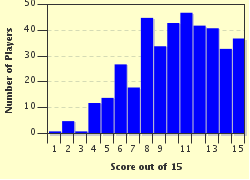Quiz Answer Key and Fun Facts
1. In Matthew 26:27-28, New King James Version, Jesus says to His disciples of the cup at the Last Supper, "Drink from it, all of you. For this is My blood of ..." what?
2. What "new" commandment does Jesus give his disciples in John 13:34?
3. In the King James Version of the 10th chapter of Hebrews, readers are given a detailed description of some of the many attributes of Christ, specifically of His sacrifice and of the covenant of God.
In verses 19-22 a viewpoint is presented that states that Jesus' blood and flesh have provided man with a new and living way to enter the holy of holies.
How is mankind now instructed to enter this holy place of God by this "new and living way" that Christ has provided, according to verses 19 and 20?
4. In the last two chapters of the book of Revelation in the NIV, John of Patmos gives a wonderful description of the place that will become the home of all those who were true to Christ even in times of great trial. What is the name of this beautiful place?
5. Paul, the author of 2 Corinthians 5:17, in the NIV Bible, writes about a person becoming a new creation and states "the old has gone, the new has come". However, to become a new creation, what condition does Paul state the person must meet?
6. In Acts 17:16-34, the apostle Paul was teaching in Athens, Greece. Among his audiences, the Epicurean and the Stoic philosophers posed a question to Paul about an extraordinary "new" doctrine that he spoke of. What was this NEW doctrine?
7. In the KJV Bible, Paul states the heart of the 'new' Christian message in Romans 5:17, saying, "For if by one man's (Adam) offense death reigned by one; much more they that receive abundance of grace and of the gift of _______________ shall reign in life by one, Jesus Christ (New Adam)." What is the missing word or words?
8. In 1 Peter 1:3, Peter says that God, in his "great mercy", "has given us new birth into a living hope through ______________________" (NIV). How is this quote completed?
9. According to 1 Corinthians 5:7 (NKJV text), Christians should aspire to be what humble, amorphous object? (Note: most translations with 'Standard' in their name use the same word. The NIV, Good News, and similar, do NOT).
10. In Matthew 9:17, Mark 2:22, and Luke 5:37-38 of the NIV, Christ says that new wine can not be put into what object(s)?
11. In the book of Revelation there is a lot of singing and music, but on two occasions it is recorded that a new song is being sung. The first new song is sung by the four living creatures and the 24 elders. What select group sings the second new song?
12. Which of the following was true about the New Heaven and Earth, according to Revelation 21:1 (NIV)?
13. Jesus appeared to his disciples several times after his resurrection and on one occasion he said to them, "And these signs will follow those who believe: In My name they will cast out demons; they will speak with new tongues [languages]" (Mark 16:17, New King James Version). When did his disciples first experience speaking with new tongues?
14. In Revelation 2:17 Jesus Christ tells of the Spirit's promises to those who overcome: they will be given some of the hidden manna, and a white stone upon which is inscribed... what?
(We can infer that Jesus is the speaker from Revelation 1:12-18.)
15. In Revelation 21:5, according to the Good News Bible, we read 'Then the one who sits __________ said, "And now I make all things new!"'. Where does this one sit?
Source: Author
Rimrunner
This quiz was reviewed by FunTrivia editor
CellarDoor before going online.
Any errors found in FunTrivia content are routinely corrected through our feedback system.

